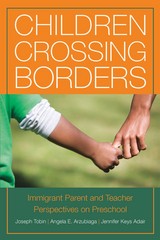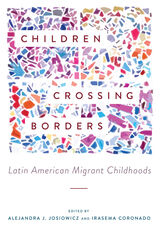2 books about Children Crossing Borders

Children Crossing Borders
Immigrant Parent and Teacher Perspectives on Preschool for Children of Immigrants
Joseph Tobin
Russell Sage Foundation, 2013
In many school districts in America, the majority of students in preschools are children of recent immigrants. For both immigrant families and educators, the changing composition of preschool classes presents new and sometimes divisive questions about educational instruction, cultural norms and academic priorities. Drawing from an innovative study of preschools across the nation, Children Crossing Borders provides the first systematic comparison of the beliefs and perspectives of immigrant parents and the preschool teachers to whom they entrust their children. Children Crossing Borders presents valuable evidence from the U.S. portion of a landmark five-country study on the intersection of early education and immigration. The volume shows that immigrant parents and early childhood educators often have differing notions of what should happen in preschool. Most immigrant parents want preschool teachers to teach English, prepare their children academically, and help them adjust to life in the United States. Many said it was unrealistic to expect a preschool to play a major role in helping children retain their cultural and religious values. The authors examine the different ways that language and cultural differences prevent immigrant parents and school administrations from working together to achieve educational goals. For their part, many early education teachers who work with immigrant children find themselves caught between two core beliefs: on one hand, the desire to be culturally sensitive and responsive to parents, and on the other hand adhering to their core professional codes of best practice. While immigrant parents generally prefer traditional methods of academic instruction, many teachers use play-based curricula that give children opportunities to be creative and construct their own knowledge. Worryingly, most preschool teachers say they have received little to no training in working with immigrant children who are still learning English. For most young children of recent immigrants, preschools are the first and most profound context in which they confront the conflicts between their home culture and the United States. Policymakers and educators, however, are still struggling with how best to serve these children and their parents. Children Crossing Borders provides valuable research on these questions, and on the ways schools can effectively and sensitively incorporate new immigrants into the social fabric.
[more]

Children Crossing Borders
Latin American Migrant Childhoods
Edited by Alejandra J. Josiowicz and Irasema Coronado
University of Arizona Press, 2022
The Americas are witnessing an era of unprecedented human mobility. With their families or unaccompanied, children are part of this immense movement of people. Children Crossing Borders explores the different meanings of the lives of borderland children in the Americas. It addresses migrant children’s struggle to build a sense of belonging while they confront racism and estrangement on a daily basis.
Unified in their common interest in the well-being of children, the contributors bring an unrivaled breadth of experience and research to offer a transnational, multidimensional, and multilayered look at migrant childhoods in Latin America. Organized around three main themes—educational experiences; literature, art and culture, and media depictions; and the principle of the “best interest of the child”—this work offers both theoretical and practical approaches to the complexity of migrant childhood. The essays discuss family and school lives, children’s experience as wage laborers, and the legislation and policies that affect migrants.
This volume draws much-needed attention to the plight of migrant children and their families, illuminating the human and emotional toll that children experience as they crisscross the Americas. Exploring the connections between education, policy, cultural studies, and anthropology, the essays in this volume navigate a space of transnational children’s rights central to Latin American life in the twentieth and twenty-first centuries.
Contributors
Marissa Bejarano-Fernbaugh
Nancie Bouchard
Lina M. Caswell
Irasema Coronado
Valentina Glockner
Alejandra J. Josiowicz
Patrícia Nabuco Martuscelli
María Inés Pacecca
Martha Rodríguez-Cruz
Emily Ruehs-Navarro
Kathleen Tacelosky
Élisabeth Vallet
Unified in their common interest in the well-being of children, the contributors bring an unrivaled breadth of experience and research to offer a transnational, multidimensional, and multilayered look at migrant childhoods in Latin America. Organized around three main themes—educational experiences; literature, art and culture, and media depictions; and the principle of the “best interest of the child”—this work offers both theoretical and practical approaches to the complexity of migrant childhood. The essays discuss family and school lives, children’s experience as wage laborers, and the legislation and policies that affect migrants.
This volume draws much-needed attention to the plight of migrant children and their families, illuminating the human and emotional toll that children experience as they crisscross the Americas. Exploring the connections between education, policy, cultural studies, and anthropology, the essays in this volume navigate a space of transnational children’s rights central to Latin American life in the twentieth and twenty-first centuries.
Contributors
Marissa Bejarano-Fernbaugh
Nancie Bouchard
Lina M. Caswell
Irasema Coronado
Valentina Glockner
Alejandra J. Josiowicz
Patrícia Nabuco Martuscelli
María Inés Pacecca
Martha Rodríguez-Cruz
Emily Ruehs-Navarro
Kathleen Tacelosky
Élisabeth Vallet
[more]
READERS
Browse our collection.
PUBLISHERS
See BiblioVault's publisher services.
STUDENT SERVICES
Files for college accessibility offices.
UChicago Accessibility Resources
home | accessibility | search | about | contact us
BiblioVault ® 2001 - 2024
The University of Chicago Press









